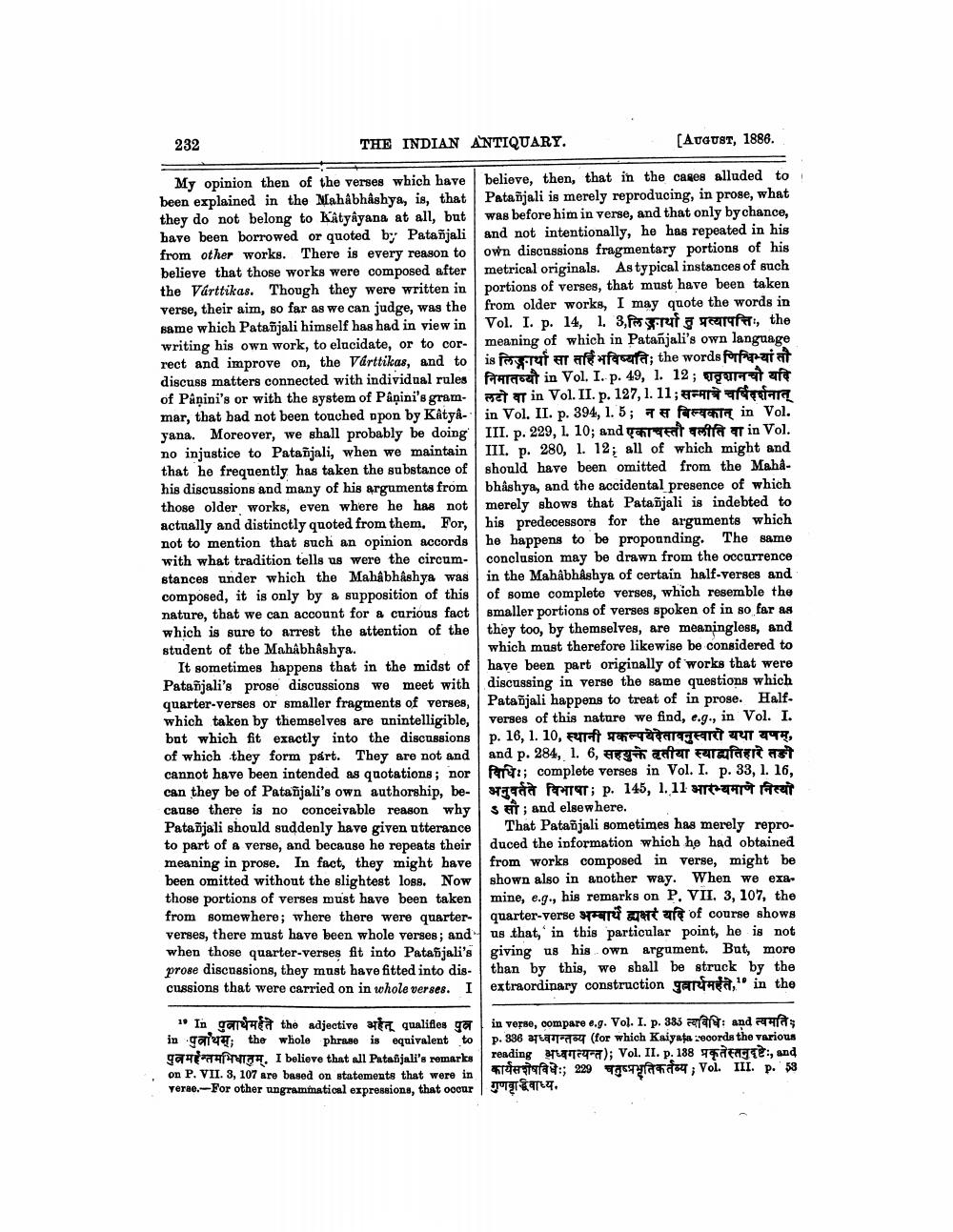________________
232
THE INDIAN ANTIQUARY.
(AUGUST, 1886.
My opinion then of the verses which have believe, then, that in the caves alluded to been explained in the Mahâbhâshya, is, that Patanjali is merely reproducing, in prose, what they do not belong to Katyayana at all, but was before him in verse, and that only by chance, have been borrowed or quoted by Patanjali and not intentionally, he has repeated in his from other works. There is every reason to own discussions fragmentary portions of his believe that those works were composed after metrical originals. As typical instances of such the Várttikas. Though they were written in portions of verses, that must have been taken verse, their aim, so far as we can judge, was the from older works, I may quote the words in same which Patanjali himself has had in view in Vol. I. p. 14, 1, 3.
p ruty gftri, the writing his own work, to elucidate, or to cor- meaning of which in Patanjali's own language rect and improve on, the Värttikas, and to is foruf af forfat; the words forfaziat discuss matters connected with individual rules Fargoeit in Vol. I. p. 49, 1. 12; Taurat af of Paņini's or with the system of Pâņini's gram. et a in Vol. II. p. 127, 1. 11; A
T C mar, that bad not been touched apon by Katyâ-in Vol. II. p. 394, 1.5; Tefahr in Vol. yana. Moreover, we shall probably be doing III. p. 229, 1. 10; and their mother or in Vol. no injustice to Patañjali, when we maintain III. p. 280, 1. 12; all of which might and that he frequently has taken the substance of should have been omitted from the Mahahis discussions and many of his arguments from bhashya, and the accidental presence of which those older works, even where he has not merely shows that Patañjali is indebted to actually and distinctly quoted from them, For, his predecessors for the arguments which not to mention that such an opinion accords he happens to be propounding. The same with what tradition tells us were the circum- conclusion may be drawn from the occurrence stances under which the Mahâbhâshya was in the Mahâbhâshya of certain half-verses and composed, it is only by a supposition of this of some complete verses, which resemble the nature, that we can account for a curious fact smaller portions of verses spoken of in so far as which is sure to arrest the attention of the they too, by themselves, are meaningless, and student of the Mahâbhâshya.
which must therefore likewise be considered to It sometimes happens that in the midst of have been part originally of works that were Patañjali's prose discussions we meet with discussing in verse the same questions which quarter-verses or smaller fragments of verses, Patañjali happens to treat of in proge. Halfwhich taken by themselves are unintelligible, verses of this nature we find, e.g., in Vol. I. but which fit exactly into the discussions p. 16, 1. 10, Faroft TanteargeITTI TUTT, of which they form párt. They are not and and p. 284, 1. 6, in der Fragen cannot have been intended as quotations ; nor PATT!; complete verses in Vol. I. p. 33, 1. 16, can they be of Patanjali's own authorship, be-
PRITT p. 145, 1. 11
freer cause there is no conceivable reason why | sat; and elsewhere. Patañjali should suddenly have given utterance That Patañjali sometimes has merely reproto part of a verse, and because he repeats their duced the information which he had obtained meaning in prose. In fact, they might have from works composed in verse, might be been omitted without the slightest lose. Now shown also in another way. When we exa those portions of verses must have been taken mine, e.g., his remarks on P. VII, 3, 107, the from somewhere; where there were quarter- quarter-verse s-arü qui fe of course shows verses, there must have been whole verses; and us that in this particular point, he is not when those quarter-verses fit into Patañjali's giving us his own argument. But more prose discussions, they must have fitted into dis- than by this, we shall be struck by the cussions that were carried on in whole verses. I extraordinary construction garrada," in the
" In प्रनामहेते the adjective अर्हत qualifes पुत्र in galy; the whole phrase is equivalent to gate . I believe that all Putajali's remarks on P. VII. 3, 107 are based on statements that were in Yerae.-For other ungrammatical expressions, that occur
in verse, compare sg. Vol. I. p. 385 त्यावधि: and त्वमाता p. 838 arvat69 (for which Kaiyata zecords the various reading Thu 7); Vol. II. p. 188 FGT, and eft:; 229 T 4 ; Vol. III. p. 53
.




